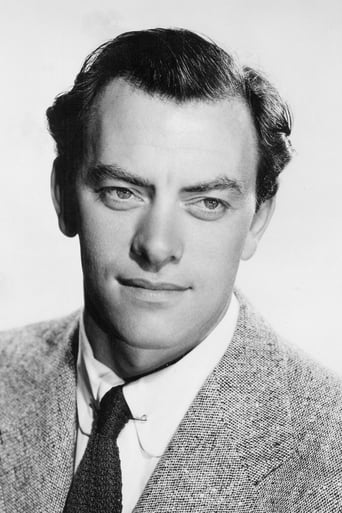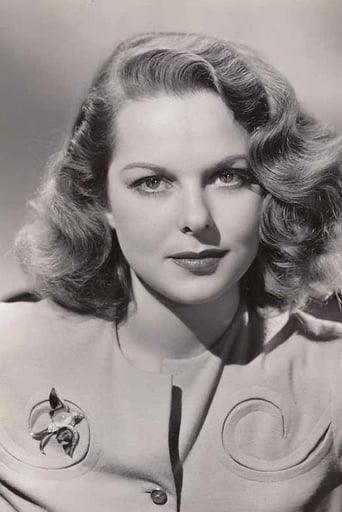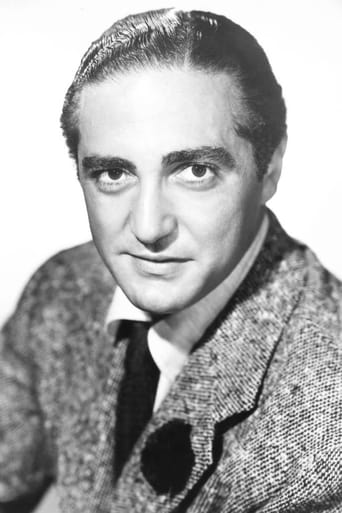Mjeteconer
Just perfect...
Anoushka Slater
While it doesn't offer any answers, it both thrills and makes you think.
Taha Avalos
The best films of this genre always show a path and provide a takeaway for being a better person.
Zandra
The movie turns out to be a little better than the average. Starting from a romantic formula often seen in the cinema, it ends in the most predictable (and somewhat bland) way.
boblipton
The opening shot is an underlit traveling crane shot, followed by an upward-tilting Dutch angle of a series of backlit faces pronouncing "Guilty." It's an open secret this film was released in 1947, when every mystery was a film noir and every decent little guy faced a faceless conspiracy.Charles Waldron Jr. tells his landlady that his old friend, John Ireland and his new bride, Jane Randolph, will be staying with him a few days. Then he hides a roll of film in his drawer and goes out. Eventually his houseguests notice he's gone and call in police sergeant Sheldon Leonard and gradually get entangled in a web of....It's not the most subtly plotted of film noirs, and there's little mystery about what sort of nasty people are behind the evil doings, but it's certainly beautifully shot by horror-movie specialist George Robinson, and well performed by all hands. Director John Reinhardt was an Austrian actor who had switched to directing Spanish language movies for Fox in the early 1930s.
mark.waltz
The end of World War II didn't end the hatred towards Jews, even in a democratic country like the United States. As evidenced in "A" films such as "Gentleman's Agreement" and "Crossfire", anti-Semitism was still rampant in the world, even though Hitler's Germany was being criticized for the cruelty of the Holocaust. Unlike the posh settings of "Gentleman's Agreement", "Crossfire" took this hatred into the darkened side streets of big street U.S.A. and added a definite film noir element into the movie's powerful theme. "Open Secret" is even tougher looking, perhaps because of its less than glossy photography, and definitely because of its independently made status.John Ireland and Joyce Randolph are a newlywed couple who arrive at the apartment of an old friend who has promised them a bed to sleep in for the night until they can find a hotel. When they arrive, they find he has disappeared, but the mystery doesn't grow until Randolph goes to develop a roll of film she's found and put into her camera (already partially exposed!) and before they can even pick up the film, they find they are in danger. Shouts of anti-semitic slurs are heard prior to this, and the pictures seem to point to both Ireland's pal's disappearance and a violent crime which has yet to be exposed.While certainly gritty and filled with some great aspects of what makes film noir fascinating, there are minor flaws in the script which makes it only slightly disappointing. However, there are more details that enhance the film rather than weaken it, such as the nosy but ultimately caring landlady (who ironically resembles Margaret Hamilton) and the round table of bigots who pass a verdict of hate, not justice, then go out to commit their crimes against society. Whether or not these men were involved with the American Nazi party is never clarified, but it is obvious that if they had been over in Hitler's Germany, they certainly would have supported the evil that was going on. There's certainly an important element of why this story needed to be told the way it is and that makes it definitely worth watching.
MartinHafer
1947 saw the debut of the film "Gentleman's Agreement" in which Gregory Peck pretended to be Jewish in order to feel what it's like to be a Jew in America. Naturally, he experiences some discrimination but it's mostly very proper ('nice' anti-Semitism) and the leading man quite handsome. It was NOT particularly gritty and I always thought the film was amazingly tame...and a bit overdone. Here, a year later, a low-budget studio had decided to do a film like "Gentleman's Agreement"--but with more normal looking folks (no handsome Peck or John Garfield here) and in a more working-class neighborhood. And, in addition, the level of hate was ratcheted up...a lot. In fact, in this sick little town, a local hidden hate group has gone so far as kill Jews! John Ireland infiltrates this group of sickies and the film lacks the pretty polish but also seems a bit more gutsy and violent. Oddly, despite the publicity for the earlier film and critical acclaim, I prefer "Open Secret" as it is much more exciting and more like a variation on film noir. A great film? No...but it certainly is interesting and the problems don't seem so mundane as those in the Gregory Peck film. As a result, it shows a seedier and uglier side to ethnic hatred.
Dewey1960
The late 1940s saw a brief spate of message movies dealing with anti-semitism, most notably the fantastic film noir thriller CROSSFIRE and the more famous but somewhat tepid GENTLEMAN'S AGREEMENT (both 1947). OPEN SECRET, from 1948, shares more in common with CROSSFIRE given its noir trappings and thriller elements. John Ireland plays ex-GI Paul Lester who, along with his new wife Nancy (the very alluring Jane Randolph) arrive in town with the hopes of visiting Paul's old army buddy, Ed Stevens. When Ed turns up missing, Paul and Nancy are tossed into the middle of a dark mystery involving a neighborhood hate group whose targets are ethnic immigrant residents and business owners. Chief among them is Harry Strauss (George Tyne) a Jewish camera shop owner who figures prominently in the search for Ed who, it turns out, has been hunted down and killed by the hate-mongers because of incriminating photographs involving a previous killing that were in his possession. The direction (by John Reinhardt) of the film is considerably more lively than most ultra-low budget thrillers and the issues it brings up are actually on the level of those tackled in CROSSFIRE. Much of the dialog is quite intelligent and pungently written, dealing with delicate issues in a frank, straightforward way. Other notably interesting people in the cast are Roman Bohnen (the well-respected left-wing blacklisted actor) as an alcoholic wife-beater and member of the hate group, Sheldon Leonard (a veteran of tons of "B" noirs) as a sympathetic cop and, in a background bit part, King Donovan (from Don Siegel's "Invasion of the Body Snatchers"). OPEN SECRET has recently been released in a budget-priced DVD and I strongly urge fans of this hybrid noir genre to check it out.




